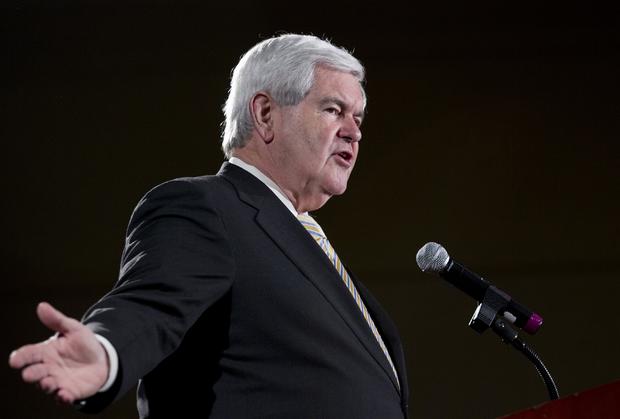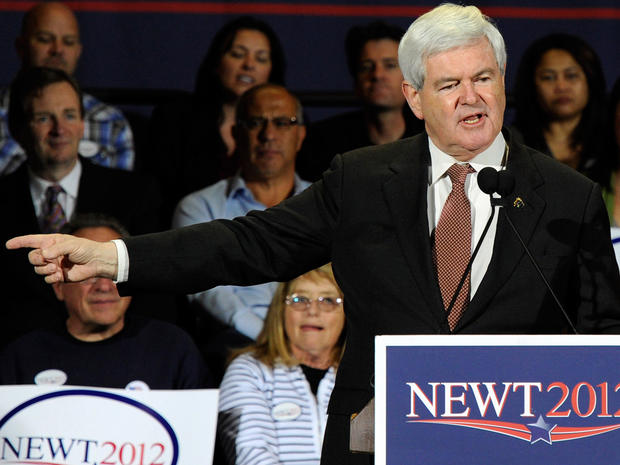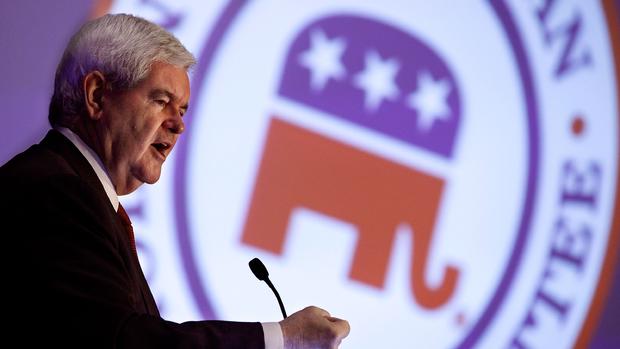Newt Gingrich's survival strategy: Can it work?
In remarks following his loss in the Nevada caucuses on Saturday, Newt Gingrich suggested his campaign strategy involves putting together a "series of victories" culminating in the April 3 Texas primary that would, theoretically, leave him even with Mitt Romney in terms of delegates.
Gingrich elaborated on CBS' "Face the Nation" the following day, saying his goal is to get "all the way to Super Tuesday and then beyond to Texas."
His goal, he added, is to "basically be about tied in delegates around the time we come out of Texas."
Gingrich's strategy is built on surviving until voting takes place in some big Southern states - starting with his onetime home state of Georgia, where 76 delegates are at stake. The Georgia primary takes place on March 6 - Super Tuesday - as do primaries in two other Southern states: Tennessee, where 55 delegates are at stake, and Oklahoma, where 40 delegates are at stake. Gingrich also looks competitive in another Super Tuesday primary, Ohio, where 63 delegates are at stake.
After Super Tuesday comes Southern primaries in Alabama and Mississippi (March 13) and Louisiana (March 24), and then the big enchilada: The April 3 primary in Texas, with its 155 delegates at stake. (Important qualifier: Because of a redistricting fight, it's not clear that Texas' primary will proceed as scheduled - though the odds of a contest at least sometime in April appear to be improving.)
To understand why Gingrich is banking on these (mostly) Southern states, look no further than the vote breakdown in the Florida GOP primary. Romney won the vast majority of the state, with the notable exception of the panhandle; Gingrich dominated in that northern section of the state, which is culturally much closer to Alabama and the rest of the South than it is the rest of Florida. Looking at that result, Gingrich has good reason to like his chances in the southern primaries if he can survive long enough to compete in them.
It's worth remembering that Romney only has an estimated 81 total delegates at this point in the process - nowhere near the 1,144 he needs to win the nomination. And while Romney is sure to rack up delegates in a number of the contests leading up to April 3, it's certainly plausible that a strong southern showing would leave Gingrich in striking distance in the delegate count after the Texas dust settles.
It's pretty far from a sure thing, however. Gingrich has a number of challenges facing him, starting with the fact that he doesn't seem likely to have very many good days between now and Super Tuesday. Gingrich has already lost his post-South Carolina momentum in the wake of his losses in Florida and Nevada; polls show him down in the two states where voters caucus on Tuesday, Colorado and Minnesota. (He's not even competing in Missouri's non-binding primary.) Romney is also expected to best Gingrich in the Maine caucuses (ending February 11) and in the Arizona and Michigan primaries on February 28.
If Romney does as well as expected in these pre-Super Tuesday states, he'll pick up momentum as headlines pile up declaring his victories. Gingrich, meanwhile, will have to work to convince voters and donors to keep treating him as a legitimate contender.
Momentum isn't the only issue. Romney is far better organized than the former House speaker, who has few-to-no paid staffers in many of the upcoming states. Romney also has a significant financial advantage over Gingrich, who reported a relatively paltry $2.1 million in cash on hand and $1.2 million in debt and obligations in the most recent filing period. (By contrast, Romney had about $20 million cash on hand.)
Gingrich has had his best moments in the campaign in the debates, where his performances have driven last-minute surges in the polls - so it doesn't help him there isn't another one scheduled until February 22. Meanwhile, polls suggest that Rick Santorum may well score a victory in the Minnesota caucuses, as well as the nonbinding Missouri primary, which would give Santorum a basis to claim that he, not Gingrich, is the real (non-Ron Paul) conservative alternative to Romney.
With establishment Republicans facing pressure not to donate to Gingrich - who many believe is doing damage to the man they see as the inevitable nominee, Romney - the former House speaker has been reaching out to non-traditional donors, according to the Wall Street Journal. In his post-Nevada remarks, Gingrich suggested that he wouldn't need much money to keep his campaign going, since he can communicate with voters via large, national media outlets that he said are part of a "national system in terms of information flow."
Exit polls suggested that Gingrich's one primary victory thus far - in South Carolina - was due in large part to two pre-primary debates in which he earned standing ovations for attacking a debate moderator and insisting that his comments about food stamps and poor children working as janitors are not offensive to blacks. Both moments seemed to tap into a sense of resentmentamong some Southern whites.
Gingrich will need to decide in advance of the southern primaries how far he wants to go in trying to recreate such moments, which risk alienating the independent-minded voters he'll need if he reaches the general election. Some liberal commentators have already accused Gingrich of a "Southern strategy" in the style of Richard Nixon that plays to negative racial stereotypes.
In his "Face the Nation" appearance on Sunday, Gingrich said his plan over the next month is to win over voters through a "focus on [the] very big differences" between himself and Romney.
"My goal will be over the course of February to show that there is a way to change Washington," he said. "And I hope by the time we get to Super Tuesday that we'll have made the case that a genuine conservative is a dramatically better choice to defeat Barack Obama than somebody who is in many ways, frankly, not very distinguishable from President Obama."
Full CBS News coverage: Newt Gingrich

